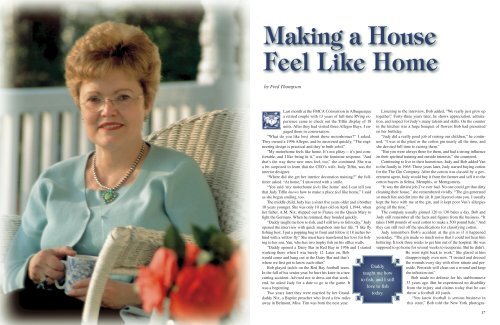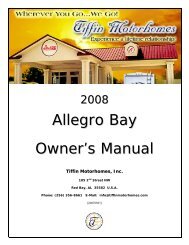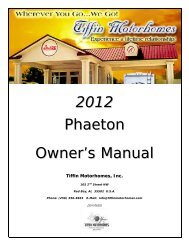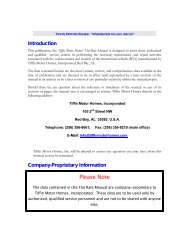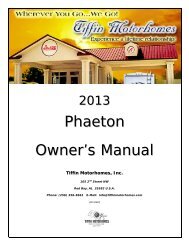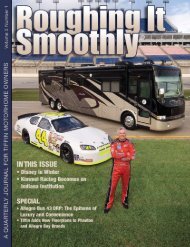Making a HouseFeel Like Homethe wounds every day with silver nitrate and peroxide.Peroxide will clean out a wound and keepthe infection out.”Bob made no defense for his stubbornness33 years ago. But he experienced no disabilityfrom the injury and claims today that he canthrow a football 40 yards.“You know football is serious business inthis state,” Bob told the New York photograbyFred ThompsonLast month at the FMCA Convention in Albuquerquea retired couple with 13 years of full-time RVing experiencecame to check out the <strong>Tiffin</strong> display of 18units. After they had visited three Allegro Bays, I engagedthem in conversation.“What do you like best about these motorhomes?” I asked.They owned a 1996 Allegro, and he answered quickly, “The engineeringdesign is practical and they’re built solid.”“My motorhome feels like home. <strong>It</strong>’s not glitzy—it’s just comfortable,and I like being in it,” was the feminine response. “Andthat’s the way these new ones feel, too,” she continued. She wasa bit surprised to learn that the CEO’s wife, Judy <strong>Tiffin</strong>, was theinterior designer.“Where did she get her interior decoration training?” the fulltimerasked. “At home,” I answered with a smile.“You said ‘my motorhome feels like home’ and I can tell youthat Judy <strong>Tiffin</strong> knows how to make a place feel like home,” I saidas she began smiling, too.The middle child, Judy has a sister five years older and a brother10 years younger. She was only 10 days old on April 1,1944, whenher father, A.M. Nix, shipped out to France on the Queen Mary tofight the Germans. When he returned, they bonded quickly.“Daddy taught me how to fish, and I still love to fish today,” Judyopened the interview with quick snapshots into her life. “I like flyfishing best. I put a popping bug in front and follow it 18 inches behindwith a willow fly.” She must have transferred her love for fishingto her son, Van, who has two trophy fish on his office walls.“Daddy opened a Dairy Bar in Red Bay in 1956 and I startedworking there when I was barely 12. Later on, Bobwould come and hang out at the Dairy Bar and that’swhere we first got to know each other.”Bob played tackle on the Red Bay football team.In the fall of his senior year, he hurt his knee in a treecutting accident. Advised not to dress-out that weekend,he asked Judy for a date to go to the game. <strong>It</strong>was a beginning.Two years later they were married by her GranddaddyNix, a Baptist preacher who lived a few milesaway in Belmont, Miss. Tim was born the next year.Listening to the interview, Bob added, “We really just grew uptogether.” Forty-three years later, he shows appreciation, admiration,and respect for Judy’s many talents and skills. On the counterin the kitchen was a huge bouquet of flowers Bob had presentedon her birthday.“Judy did a really good job of raising our children,” he continued.“I was at the plant or the cotton gin nearly all the time, andshe devoted full time to raising them.”“But you were always there for them, and had a strong influenceon their spiritual training and outside interests,” she countered.Continuing to live in their hometown, Judy and Bob added Vanto the family in 1965. Three years later, Judy started buying cottonfor the The Gin Company. After the cotton was classed by a governmentagent, Judy would buy it from the farmer and sell it to thecotton buyers in Selma, Memphis, or Montgomery.“<strong>It</strong> was the dirtiest job I’ve ever had. No one could get that dirtycleaning their house,” she remembered vividly. “The gin generatedso much lint and dirt into the air. <strong>It</strong> just layered onto you. I usuallykept the boys with me at the gin, and it kept poor Van’s allergiesgoing all the time.”The company usually ginned 120 to 130 bales a day. Bob andJudy still remember all the facts and figures from the business. “<strong>It</strong>takes 1600 pounds of seed cotton to make a 500 pound bale.” Andthey can still reel off the specifications for classifying cotton.Judy remembers Bob’s accident at the gin as if it happenedyesterday. “The gin made so much noise that I could not hear himhollering. <strong>It</strong> took three weeks to get him out of the hospital. He wassupposed to go home for several weeks to recuperate. But he didn’t.He went right back to work.” She glared at himdisapprovingly even now. “I treated and dressedDaddytaught me howto fish, and I stilllove to fishtoday.17
pher who accompanied me on the interview. “Naw,” Pete suppressedhis smile and tried to fake a Southern accent. “I neverwould have guessed from all the Bear Bryant and Alabama stuffon the walls at the office.”In 1975 Bob and Judy decided it was time tocomplete the family and they added Alex, namedafter his Grandfather <strong>Tiffin</strong>. “<strong>It</strong> took me 10 yearsto get over Tim and Van before I could have Lex,”Judy laughed. “Tim loved to pick on Van until hehad all he was willing to take, and then they wouldgo at it. The Lord only knows how many times Ihad to separate those two.”Grandpa Alex and Granny enjoyed participatingin the raising of the two older boys and gave them jobs at the lumberyard. “Grandpa told Van not to tell people how much he wasbeing paid,” Judy related. “‘Don’t worry, Grandpa,’ Van said, ‘I’dbe ashamed for anyone to know.’ Tim was shocked and couldn’tbelieve Van had said that.” Bob laughed heartily again at a familystory he no doubt had told himself.Judy continued in her role as cotton buyer until 1977 when Bobsold the gin to a company in Georgia. As <strong>Tiffin</strong> <strong>Motorhomes</strong> beganto build one motorhome a day, Judy added another job titleto her resume which already included wife, mother, and cottonbuyer. As interior decorator, she selected and coordinated the materialsfor curtains, sofas, chairs, bedspreads, and carpeting. Sincethe motorhomes at that time were much smaller and simpler thannow, and there was only one model, not five, Judy did not regardthe new responsibility as overwhelming.Sewing had always been a practical hobby for her, which madeplanning the production facility to create curtains, coverings for sofasand chairs, and bedspreads simply an extension of her homemakingskills. She saw her job as making a coach feel like a home. The earlyAllegros were designed for families and some could sleep as manyas eight with the pull down bed above the driver, the bedroom in therear, the sofa bed, and the dinette which made a double for children.In the late eighties and early nineties a new market demand beganto strongly influence the floorplans and amenities offered inShe sawher job as makinga coach feel like ahome.Class A coaches. Instead of accommodations for six or eight, emptynesters wanted floorplans designed just for them. The “one modelfits all” plan over a short time expanded into three, then four, andfinally five model lines—all of which greatly increased Judy’s interiordesign responsibility. She took it in stride.To find a broader variety of materials, she beganto make regular seasonal trips to the textile manufacturersshowing in North Carolina. Her assistant whotraveled with her marveled at the number of fabricshows and buying appointments Judy scheduled inone day. How could a woman in her fifties completelywear him out, he wondered. Judy was aware ofthe adage, “time is money,” and wasted neither.Lighting and plumbing fixtures, valances, day-night shades,molding, counter surfaces, etched glass, ultraleather, multipleslide-outs — all figured into a more coordinated, complex interiordesign to please buyers who wanted more luxurious coaches. Butshe realized, too, that the company’s bread-and-butter market wasthe dependable and sturdy Allegro. “You don’t forget your roots,”she thought, as she continued to tastefully coordinate the featuresand amenities of the <strong>Tiffin</strong> foundation model.Judy’s flair for interior decoration had another side whichwas not apparent when you walk through the five <strong>Tiffin</strong> productlines—Antiques! She and Bob began collecting while they werestill living in Red Bay. But the collection took a serious turn in1995 when they saw an 1888 three-story Victorian for sale on historicWood Avenue in Florence, Alabama, almost an hour’s drivefrom the Red Bay plant.“When Bob saw the woodwork, he fell in love with it,” Judysaid. The wainscoting, the double-entry doors, the stairwell withlanding, the floors—the whole house exuded a craftsmanshipand character that was irresistible to her husband. “This is Bob’shouse,” she explained as we began the tour. “<strong>It</strong> took me a while,but now I’ve got my special places.”The house was known throughout Florence as the Town Club,and had been used commercially by its former owners for specialparties, dinners, and wedding receptions. The wainscoting poseda special problem. <strong>It</strong> had been covered withseveral coats of lacquer, turning it almostblack. Judy supervised a team of workmenwho for several months stripped the darklacquer, revealing the beautiful natural oakwhich you see today.Bob supervised the exterior renovationand the structural changes. The house neededa new roof—and that did not mean blackfelt and shingles. The job required a specialistwho could fabricate the unique metalworkrequired for Victorian architecture.Bob studied the detail the house needed andeventually found the right craftsman. <strong>It</strong> wasa restoration so tedious that the craftsmanBob and Judy’s century-old Victorian onFlorence’s Wood Avenue lends itself to graciousentertaining. Behind Judy is an original mural ofthe Forks of Cypress, an antebellum home whichburned several decades ago.made Bob promise never to tell who did the work. “That roof willlast a hundred years,” he beamed.Thinking ahead for their later years, Bob had workmen tear outthe back stairwell and install an elevator serving all three floors. <strong>It</strong>came in handy when they had to get their furniture up to the secondand third floors.Serious and knowledgeable collectors, the <strong>Tiffin</strong>s found timeto make trips to favorite dealers, especially those in southernPennsylvania. Judy knew that restoring a Victorian of this caliberdemanded many period pieces to validate its character. Shebegan to assemble their eclectic collection into the generouslysizedrooms, so that each piece now appears to belong in its appointedposition.Judy’s skill for decorating in the Victorian genre was not innate.As you walk through their home, the bookshelves and tableson the second and third floors bulge with books about architecture,antiques, fabrics, and interior design. She absorbed and applieduntil the rooms began to reflect not only the romantic aura ofa Queen Anne Victorian, but also the comfortableness that madethe big house feel like a home. Somehow she removed the formalityand stiffness usually associated with the era.They both agreed that the unfinished attic should be used forplain old “fun space,” with the grandchildren in mind. The hugetimbered roof beams were enclosed and the high ceiling in thespacious game and play room was fitted with a skylight. <strong>It</strong> wasthe right place for the big screen television to watch the Alabamafootball reruns (they usually attend all the games during the fall).And what about those special places she mentioned. The atticnow accommodates Judy’s sewing room. Practically, she installeda large cutting table with an acrylic top printed with measuringscales. And traditionally, there is a small antique rocker that sheenjoys while knitting and sewing. And a private space? Yes, Judyhas a sitting room on the first floor near the back of the home. <strong>It</strong>’sfor reading or just taking a nap. “I’m trying to retire, but I’m havingto get used to the idea,” she admits.Like any proud grandparents, Bob and Judy are enjoying watchingtheir grandchildren develop and grow up. “Tim and Lynne havetwo boys and two girls. Trent is into tennis and Brock soccer. Hannahis a gymnast and Laura is an artist,” Judy explained.Van and Michelle have Van Leigh, Jr., and Shelby. “Shelby andLeigh spend just about every Sunday afternoon with us. Leigh istaking after his Dad in learning to kick field goals and extra points.He plays for the Muscle Shoals High School football team,” thegrandfather said. For the uninitiated, Van still holds the field goalrecord at Alabama, where in four years he never missed an extrapoint. “Shelby is my little homemaker. We like to knit, sew, andcook together,” Judy says.“Lex and Denisha do not have children yet. There may be moregrandchildren in our future,” she said.Bob and Judy try to go to as many of their grandchildren’sgames as possible. Participation is not just a tradition in this family—it’sa must.And what else does this energetic grandmother have in mind?“One of my favorite vacation places is northern California. Ilike the climate in the Napa Valley. And I love Santa Fe. The airsmells so wonderful. I don’t think I’ve ever been any place I didn’tlike. When I go with Bob to RV shows, I take off and visit antique,The third floor turreted porch offers a commanding view of WoodAvenue and has become the traditional location for the neighborhood’soutdoor Christmas tree.yarn, and quilt shops, and museums. But I still like to examine thecompetition to see what we are up against,” she says, not havingshed that business mantle completely.“I admire people who get in a motorhome and just go—theyare still learning. They’ve got interests and they are inquisitive.Bob and I like to go, too, when he feels like he can take off. Lastfall we flew to Albuquerque and picked up a motorhome. We wentto Santa Fe and Taos, New Mexico, and then on to Durango, Colorado,where we rode the train from Durango to Silverton. Thenwe went to Prescott, Arizona, and finally to Pomona, California,where we sold the motorhome and flew home. In 1993 we took amotorhome to Coeur d’Alene, Idaho, and back. Great trip!” sheremembered. “We took our first long motorhome trip back in August1975. Lex was only two months old, Van was 10, and Timwas 13. I can’t enumerate all the trips we have all made since thatfirst trip. <strong>It</strong> surely has been a good ride.”Their home on Wood Avenue is just a few blocks from the Universityof North Alabama campus. “I love to take classes, and Imay enroll for one or two this fall. I am a work still in progress,”she concluded.18 ROUGHING IT SMOOTHLYMAKING A HOUSE FEEL LIKE A HOME 19


